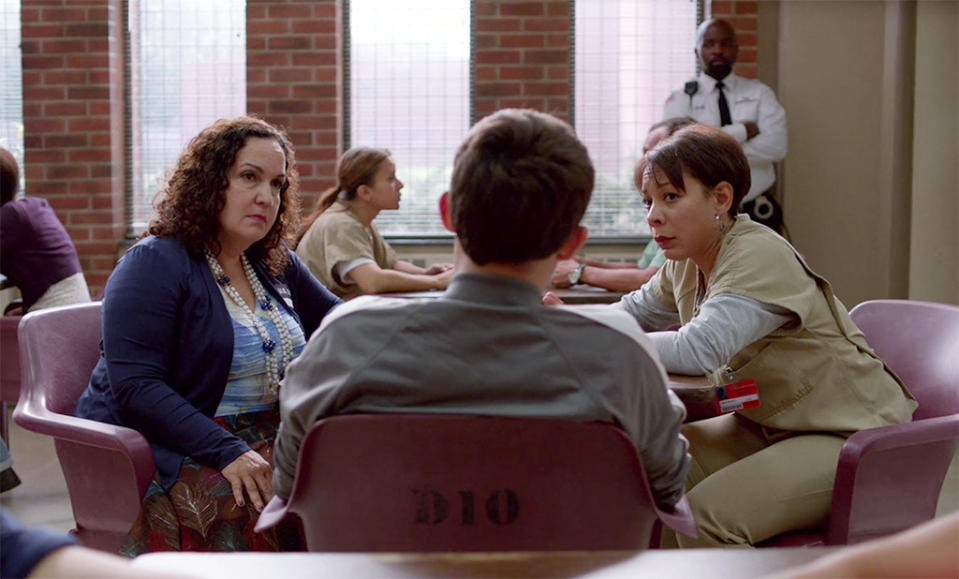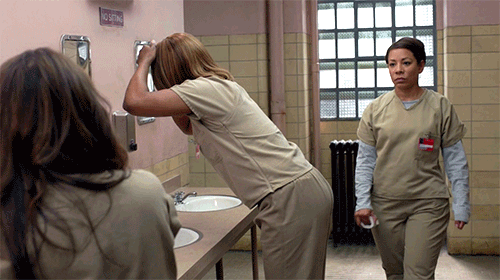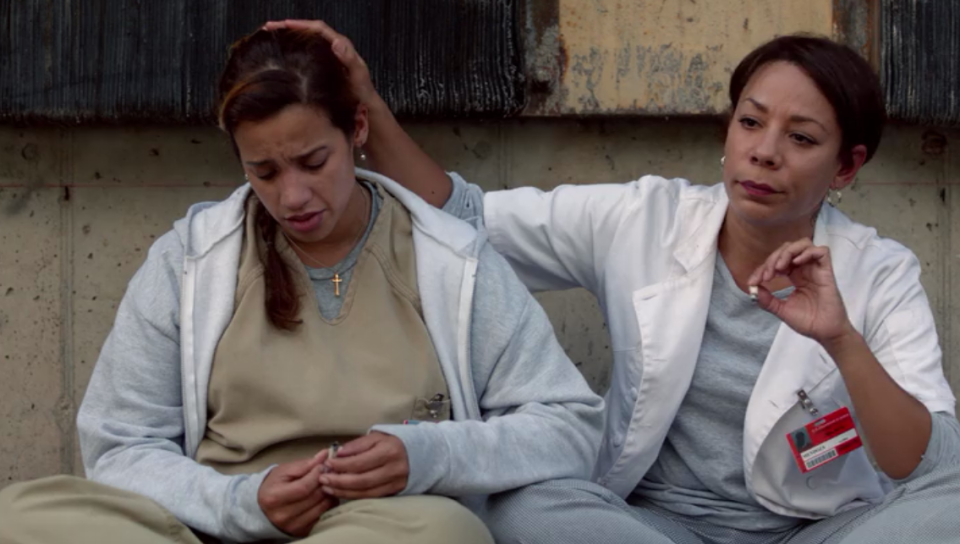Emmy Talk: ‘OITNB’ Star Selenis Leyva on Fierce Mama Gloria’s Family Troubles and Her Fight with Sophia

Selenis Leyva in ‘Orange is the New Black’ (Photos: Netflix)
As we enter Emmy season — nomination voting runs through June 27 — Yahoo TV will be spotlighting performances, writing, and other contributions that we feel deserve recognition.
Warning: This interview contains spoilers for Season 3 of Orange Is the New Black.
Like a few Orange Is the New Black characters we didn’t get to know well in the series’ first season, Gloria Mendoza has emerged as a layered, compelling figure, a tough inmate who gives off a “don’t mess with me” vibe to other Litchfieldians, but who is also a friend and mama figure to her fellow Latina prisoners. Thanks to a powerful — and, it turns out, very personal — performance by Emmy-worthy Selenis Leyva, Gloria’s storyline was one of Season 3’s most riveting, as frustration with limited access to her troubled son led to a blowup with Sophia that ended with a physical attack on Sophia by other inmates and a trip to the SHU, which Sophia is still dealing with when Season 4 begins on June 17.
Leyva, who’s also known for her performances on Law & Order, The Sopranos, The Good Wife, and Veep, talked to Yahoo TV about her character, who’s an homage to the strong women she was surrounded by growing up in the Bronx; what she does to create Gloria’s “don’t mess with me” face; and why having a transgender sister made her grateful a writer like Jenji Kohan is portraying issues faced by transgender people on OITNB.

Season 3 was such a powerful one for Gloria. She is one of the best examples of the frustration and desperation and helplessness and guilt mothers who are incarcerated must feel, and your performance was crushing, to see that all play out with her as she tried to stop her son Benny from heading down a bad path.
Thank you for that. Season 3 for Gloria was filled with all of those emotions, the frustration, the sadness, the anger, the love… she really went through an amazing journey in Season 3. I’m so grateful as an actor to be able to just dive into that world. You know, Gloria started out as a [supporting] player, like most of these characters do. I was told she’d be in a couple of episodes, and then to have such a season — to start with one line in the pilot and then to have a season where I was able to explore this woman and all her layers. This is a woman who has a big heart, a lot of passion. Her strength was evident in Season 2 when she stood up to Red and Vee, but in Season 3, you really got to see this is a woman who is trying to survive. She’s trying to make the best of the situation in the prison, and struggling to be a mother and struggling to incorporate the outside world with the inside world.
Her biggest goal is to survive inside, so that she can go outside and be the mother that she longs to be to her kids. She has four kids on the outside, one kid that we’ve really been introduced to with his problems. Let’s see what happens when the other kids are introduced. Let’s see what Jenji has in store. For Gloria, her biggest prize will be walking out of that prison one day and being a mother again to her kids. And she realizes that the more time she spends in the prison, the less likely it is that she will have her kids waiting for her on the outside. That is suffocating her.

And that led to her conflict with Sophia (Laverne Cox), which spun out of control on both sides.
Her conflict with Sophia was just so fulfilling, because I knew that if anyone was going to deal with transgender issues [in a great way], it was Jenji Kohan, in a way that’s smart, complex, and also giving a voice — a real, real, honest, human voice to this situation. I have a transgender sister. Those scenes were really hard to go in and dive into the way I had to. I had to put aside my own feelings and say, “I’m going to be as raw as possible, because this is a conversation that needs to be out there.” I’ve had to watch my sister endure such hate, such hateful glares, words, attacks. I’ve had to sit back and watch that, and at times fight back. I knew what that scene was going to feel like for Laverne, or at least somewhat feel like, because I wasn’t able to feel my sister’s pain, but I was able to live it with her, hold her hand through it. I knew that the words that were being directed at Laverne were not fictional, and were not things that Laverne had never heard before. For me, I just wanted to stop, and go, “Cut, let’s just hug it out,” because I knew that that was real life for Laverne and for so many in the trans community.
For me, as a sister of a transgender woman, I fight every day for people not to say those things. I fight every day for a trans person not to be attacked that way. It was a hard moment, but I knew I had to go there. For Gloria, it wasn’t about her attacking Sophia for being a trans woman, it was her attacking her for feeling that she took her son away from her. Aleida brought in the other element, which really then got things going. It wasn’t Gloria. Gloria was not interested in that aspect. She doesn’t start trouble; trouble comes to her. She squashes it and keeps moving. She does not like confrontation. She likes to stay in her lane, and that’s what I love about her, but at the same time, she’ll fiercely defend what she feels is part of her plan.
Those scenes with Laverne, I had a lot of preparation for — a lot of mental, emotional preparation. We checked in with each other all the time. “Are you okay?” “Yes, I’m fine.” “Okay, let’s continue.” The love and respect for my castmates helped me go to places with Gloria Mendoza that I didn’t foresee in Season 1. She’s a really complicated, funny [woman]. She’s a survivor of domestic violence. She is a mother hen. What makes her survive in that prison is taking care of everyone. She wants to take care of people. That is her. Red needs the kitchen. Gloria needs to take care of those girls. She becomes a leader. She takes care of all of them, from Aleida to Maritza, and that’s what she needs in order to survive.

What made that storyline with Sophia even more impactful is that this was behavior that was out of character for Gloria. She isn’t someone who walks around with those hateful feelings. Despite everything that has happened to her and the frustrations of her situation, she’s not a bitter woman. What prevents her from becoming bitter about her life, and what do you infuse her with to portray her as tough, but not bitter?
The humanity, the heart. Her heart is bigger than her bark. She’s tough. The stern looks… I decided to give Gloria a shield. That shield was always going to be in her face. Her resting face is a tough face. It’s not a relaxed face. The lips are perched together. There is tension in the jaw. There is tension in the eyes. The eyebrow is lifted. That says, “Don’t mess with me.” That is her prison face. That is the face that she had to come in with. She knew she had to come into this place, and in order to survive, present herself in a certain way. It’s worked for her. That is her armor. How wonderful that when you got to see her in the kitchen, when things aren’t going crazy, you got to see her relax. You got to see her with her girls, being the mother. “Take care of this. Do that.” She enjoys the times that she can have one-on-one conversations with Aleida, when it’s not do-or-die conversations. She enjoys sitting around with the girls and giving them advice. You see the soft side of her then.
One of the scenes I love, that really shows who Gloria is, is episode 4 in Season 3. Gloria is sitting by the loading dock, smoking her cigarette, and here comes Daya. And Daya is destroyed. Gloria knows this woman is going through it. She sits with her, she gives her love… she has a moment with her where you can see this woman cares for this child. This woman has been there. In that scene, she relaxes her jaw. She relaxes her eyebrows, to become a woman, a mother. I enjoyed that very much, to be able to bring both of those elements, the fierceness and the motherhood.

You helped develop your character with the writers, correct, it was a collaborative effort? What was your number one desire for the character, what you wanted her to be or things that you definitely didn’t want her to be?
When we say it was a collaborative effort, it was collaborative in the sense that I came in and I took these two lines that they gave me in the pilot episode, and I made a whole world out of them. I gave Gloria an identity. I [assigned] her a background. Whether they used it or not, it’s okay. I said, “This is a woman who was a single mom. She’s of Puerto Rican descent, and she was raised in the Bronx.” That’s what I gave her. I did that because I grew up in the Bronx and the majority of my friends were Puerto Rican, and all of them came, for the most part, with single moms. These women were tough. These women were scary. We would see them walking down the street, and everyone knew them. Everyone had a lot of respect for them, but we were terrified of them. Why? Because we knew they were tough, and we knew they would tell it like it is. As soon as you walked into [one of their] apartments, they yelled. She’d say, “Take your shoes off! Go wash your hands, and come eat!” You’d do exactly that, and you’d sit down with her, and then the woman would crack a smile and then she’d laugh. Then she’d start telling stories. Then she would relax in her home, in her kitchen.
Gloria came from those women. It was the hard exterior, but inside they were all soft and pink, and that’s who Gloria is. That’s my homage to the street that I grew up on in the Bronx, on Bainbridge Avenue. Between Bainbridge and Rochambeau Avenue in the Bronx lived amazing, amazing women. Their sole responsibility and goal in life was to make sure that their children were cared for. They did just that. They were my muses.
I think [the writers] just saw that. Jenji said to me, “You made me write for you. You made us pay attention.” That is the best compliment anyone can give an actor, especially [from] Jenji Kohan. They developed Gloria as it went along. I do recall, every time I’d get a script, I would kind of chuckle, because I said, “Wow, it’s clear they know who this is.”

The new season premieres this weekend. I know you can’t say much, but we know Gloria is still racked with guilt about the situation, and is being proactive about trying to help Sophia get out of the SHU.
Yes. You know, what I can say is that you will continue to see Gloria struggle with the consequences with what happened in Season 3. That’s what I love about Jenji’s writing. She doesn’t fix things in one episode. She lets it breathe, and she lets it carry on sometimes into another season and maybe beyond. Gloria feels bad. She wants to make it right. You are going to continue to see her trying to do that.
Are you about to start filming Season 5?
We are, we start production in a couple of weeks. Everyone’s really excited. I know I can’t wait to read that first script. I don’t know what’s in store, but you’ll see, the way Season 4 ends, it is quite something. I can’t wait to see where we go from there. Getting a script is always like receiving a gift. You don’t know what’s in store. You go, “I know what I want. I hope they’ve been paying attention, because I know what I want [to happen].” Then sometimes you get exactly what you want. Sometimes it’s better. Sometimes you’re a little disappointed, because you’re not sure how something is going to fit, but then eventually it does.
Orange Is the New Black Season 4 premieres June 17 on Netflix.
Read more Emmy Talks:
Emmy Talk: ‘AHS: Hotel’ Star Denis O’Hare
Emmy Talk: ‘Better Call Saul’ Star Rhea Seehorn
Emmy Talk: ‘Master of None’ Co-creators Aziz Ansari and Alan Yang
Emmy Talk: ‘People v. O.J. Simpson’ Star Sterling K. Brown
Emmy Talk: ‘The Americans’ Star Alison Wright
Emmy Talk: ‘Jessica Jones’ Star David Tennant
Emmy Talk: ‘The Grinder’ Fred Savage
Emmy Talk: ‘Silicon Valley’ Star Thomas Middleditch
Emmy Talk: ‘Crazy Ex-Girlfriend’ Songwriting Duo Rachel Bloom and Adam Schlesinger
Emmy Talk: ‘House of Cards’ Star Joel Kinnaman


